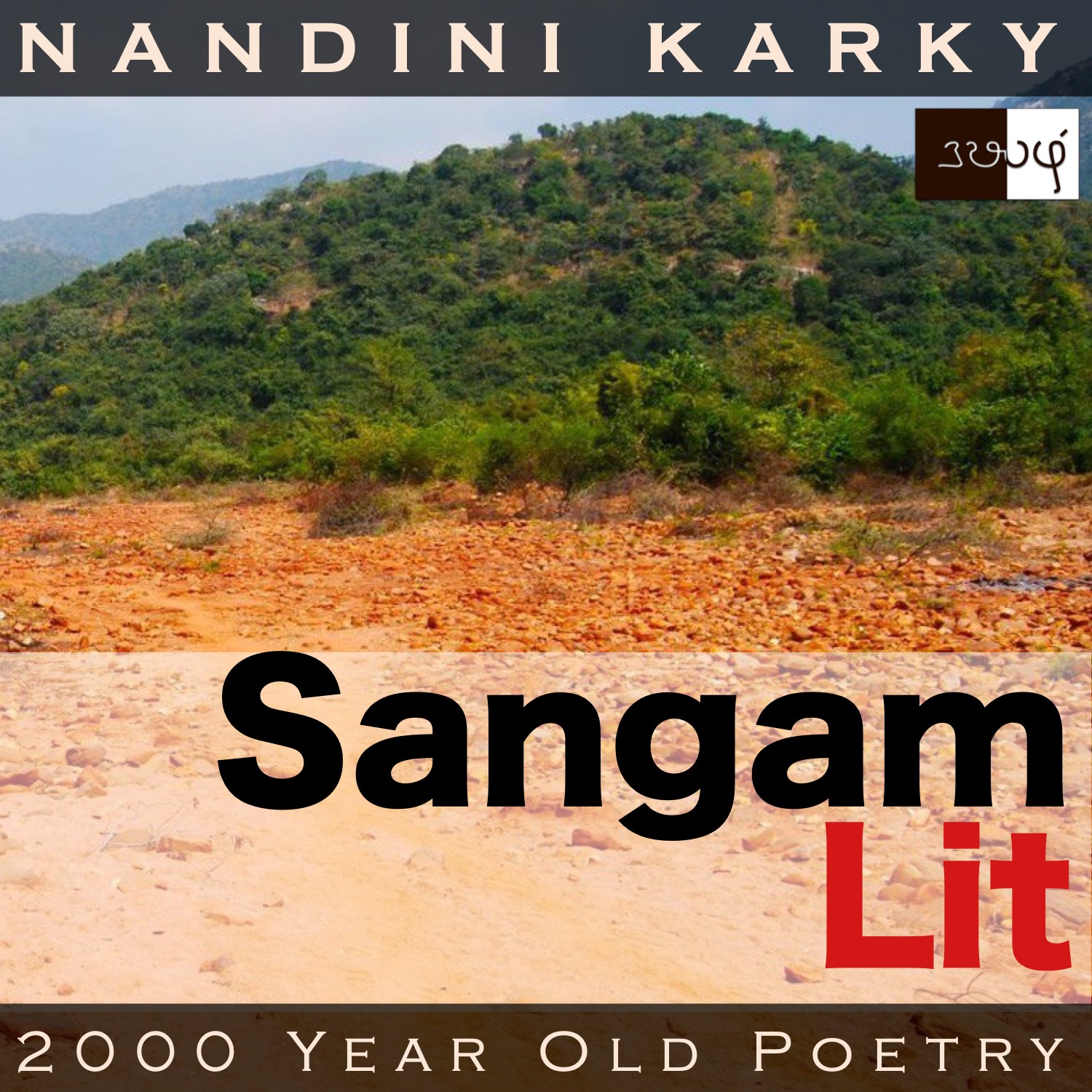Podcast: Play in new window | Download
Subscribe: Apple Podcasts | Spotify | Amazon Music | Android | iHeartRadio | TuneIn | RSS | More

In this episode, we perceive a marked transition in the life of a young girl, as depicted in Sangam Literary work, Natrinai 324, penned by Kayamanaar. The verse is set in the drylands of ‘Paalai’ and speaks in the voice of wayfarers, who sight the lady and the man in the drylands path, as they elope away together.
அந்தோ! தானே அளியள் தாயே;
நொந்து அழி அவலமொடு என் ஆகுவள்கொல்,
பொன் போல் மேனித் தன் மகள் நயந்தோள்?-
கோடு முற்று யானை காடுடன் நிறைதர,
நெய் பட்டன்ன நோன் காழ் எஃகின்
செல்வத் தந்தை இடனுடை வரைப்பின்,
ஆடு பந்து உருட்டுநள் போல ஓடி,
அம் சில் ஓதி இவள் உறும்
பஞ்சி மெல் அடி நடைபயிற்றும்மே!
The verse opens with ‘அந்தோ’ meaning ‘alas’, echoing aloud the sympathy felt by someone. The phrase ‘அளியள் தாயே’ meaning ‘pitiable mother’ clarifies the object of that sympathy. When mothers come into the picture in Sangam literature, daughters cannot be far behind. As expected, we glimpse ‘பொன் போல் மேனித் தன் மகள்’ meaning ‘her daughter with gold-like skin’. Father too, greets us in ‘செல்வத் தந்தை’ or ‘father, a man of wealth’. In the phrase ‘ஆடு பந்து உருட்டுநள்’, we see the curious case of creating a noun from the actions of a character. This means ‘she who rolls and plays with a ball’. The girl is given another epithet in ‘அம் சில் ஓதி’ meaning ‘a girl with delicate hair’ and this has generally been used to highlight the young and immature state of a girl. Ending with ‘பஞ்சி மெல் அடி நடைபயிற்றும்மே’ meaning ‘she takes steps with her cotton-like feet’, the verse urges us to walk along!
The man and lady had been leading a love relationship and in due course, the man went to seek the blessings of the lady’s parents. For some reason, they refused to give their daughter in marriage to the man and started looking out for proposals from strangers. Realising they had no other go but to elope, the man and lady leave the lady’s village. As they are walking in the drylands path, some wayfarers, who see them, say, “Alas! Her mother is a pitiable one. What is to become of her as she grieves and suffers now? That mother who loved her daughter, her girl with skin akin to gold. In her father’s forests, elephants with mature tusks are abundant, and he is a man, who wields powerful spears shining as if coated with oil. Like she would run behind a rolling ball in the wide open spaces of her wealthy father’s mansion, this young girl with delicate, fine hair now walks ahead with her cotton-like, gentle feet!” With these words, the wayfarers comment on how young the girl is and how she shall be missed by her mother and father, as she takes on this journey filled with hardship!
Time to delve into the details! The moment the wayfarers glimpse the lady in the desert path, their thoughts immediately turn to the lady’s mother and they empathise with her pain, calling her as someone to be pitied, further reflecting on how she would be broken, now that the girl walks on this path with her man. This gives us to understand that it was a rare sight indeed for a man and lady to be found in a drylands path and the only reason inferred would be that they were eloping away to get married in the man’s village. They talk about the beauty of this lady, who seems to be glowing like gold in the blazing sun and think about how much the lady’s mother must have cherished her. From the heart of the mother, the wayfarers turn to the land of the father, where elephants with sturdy tusks roam the jungles. This gives a hint that the lady’s country is situated in the mountains of ‘Kurinji’. Further, they talk about how the father owns shining spears, indicating perhaps that he was a chief, known to render aid to kings during battles. After these character sketches of the father and the mother, the focus turns to the father’s house, where the lady has been known to run behind a ball in the wide spaces. In addition to playing with a ball, the young age of the girl is further highlighted with reference to her scanty hair, indicating she is yet to mature. Finally, they talk about the cotton-like feet of the lady, as she treads on the hot sands of the drylands path!
As we come to the end of this path, we are left with many questions! Who are these wayfarers who seem to know the lady and her parents well? Were they sent by the lady’s parents to know the whereabouts of the lady? Why do these parents first refuse to give their girl in marriage and then, end up in angst, when she elopes away with the man? These questions puzzle us in the present as our own customs would puzzle those in the future. What were they thinking, they are sure to ask, for in hindsight, everything seems so obvious. Rare is the vision to look ahead in the present moment and understand the far-reaching consequences of our actions. Akin to this lady, who has left behind her comfortable past to find a new path with her man, perhaps we too should attempt to let go of the past and seek new ways to guide us into a better future!




Share your thoughts...